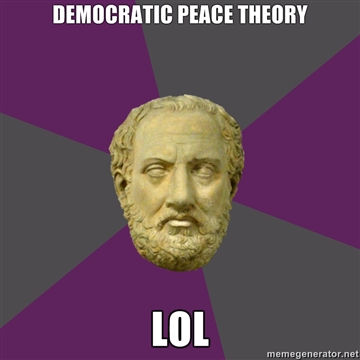 Occasionally, you’ll see some politician (for example, former UK Prime Minister Tony Blair) make the assertion that no two democratic nations have ever gone to war. I know that I’m hardly one to criticize the former Prime Minister of the entire United Kingdom, but I’ll criticize democratic peace theory (DPT), nonetheless.
Occasionally, you’ll see some politician (for example, former UK Prime Minister Tony Blair) make the assertion that no two democratic nations have ever gone to war. I know that I’m hardly one to criticize the former Prime Minister of the entire United Kingdom, but I’ll criticize democratic peace theory (DPT), nonetheless.
The problem with DPT is that it relies on shifting definitions of both “democracy” and “war”. For instance, if I point to the Peloponnesian War as an example of war between democratic states, people will invariably point out the limited franchise in the Greek state (18 year olds, male, property owners), and the existence of slavery as reasons not to classify even Athens as a true “democracy”.
You can see the problem here; the United States hasn’t even fit that definition since about the early 20th Century; the mid-20 Century if you suggest that the end of Jim Crow truly democratized/ended slavery the South (and there are more then enough facts to back you up there, though others might suggest that slavery continues to this day). So that tosses out wars like the American Revolution and the War of 1812 (fought between the democracies of America and the United Kingdom). It tosses out the American Civil War.
I could go on with examples, but this great list has been existence on the Internet since 1998. It includes the mathematical probability of two democracies fighting an international war between World War 2 and Y2K (19.8%). Basically, it’s highly unlikely that a democracy would fight an international war, because A) democracies are relatively rare in the world, and B) so are international wars. So it’s not a question of government type, it’s a question of probability.
To throw out one final example; the Hamas government in Palestine’s Gaza Strip has recently fought a series of conflicts with Israel. Both governments were democratically elected (Hamas came to power after an election prompted by American democracy-spreader George W. Bush). In contrast, the less-militant Fatah government in Palestine’s West Bank, which is technically not democratically elected (it lost to Hamas yet refused to give up power) has pursued a diplomatic solution in the United Nations. How do we make sense of democracy and dictatorship then?
The issue is that proponents of democracy use it as a sort of cure-all for issues around the world. The reality is it’s not. Democracy requires a lot of work to get right, and has had critics from almost the beginning (the aristocrat Plato’s Republic is an example of a definite non-democracy, his mentor Socrates being notably put to death by a democratic government).
It also puts a greater value on the citizens of democracies. “Oh democracies would never go to war with each other, but non-democracies, who cares?” As though the lives of the citizens of non-democracies are less important. I’ve also heard DPT reduced to this tricky statement: “no democracy will willing vote for what it believes to be an offensive war.”
The problem is when has there ever been a war that couldn’t be turned into a defensive war? I mean, even James K. Polk portrayed the Mexican-American War as a defensive war.
Democracy rocks, but it’s not free of imperfections. It’s not like it’s infallible. We see that every day, voters and politicians can make mistakes too. Perhaps we might remember these words from Winston Churchill: “Many forms of Government have been tried and will be tried in this world of sin and woe. No one pretends that democracy is perfect or all-wise. Indeed, it has been said that democracy is the worst form of government except all those other forms that have been tried from time to time.”

